Italian text is followed by English
Oggi vi presento il secondo gruppo di relatori che andranno ad arricchire il programma di questo secondo WordCamp della capitale.
Diversi per competenze e background, accomunati dal tema che tratteranno. Parleranno di sviluppo, non solo legato a WordPress, quindi potranno illuminarvi anche se lavorate con uno strumento diverso dal nostro amato software.
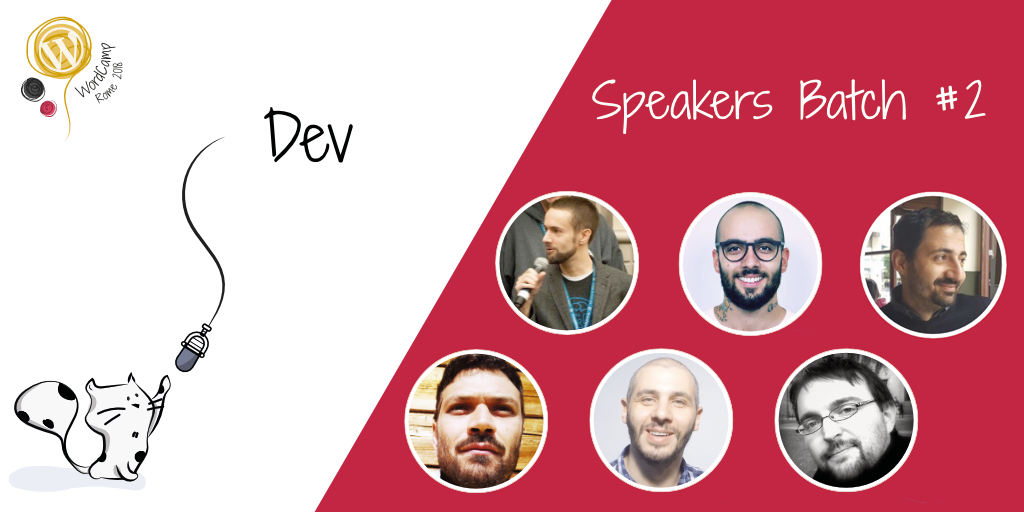
Detto questo cosa state ancora aspettando? Acquistate il biglietto e non perdertevi questi interessantissimi speaker!
Passo a presentarveli uno ad uno.
Filippo Gangi Dino
Con un passato da grafico pubblicitario e anni di consolidata esperienza prima su WordPress e poi con Ruby. Ora si destreggia tra Javascript ed Elixir. Lavora presso WeLaika e organizza il TorinoCodingSociety.
Amante del TDD, del ‘clean code’ e dell’open source.
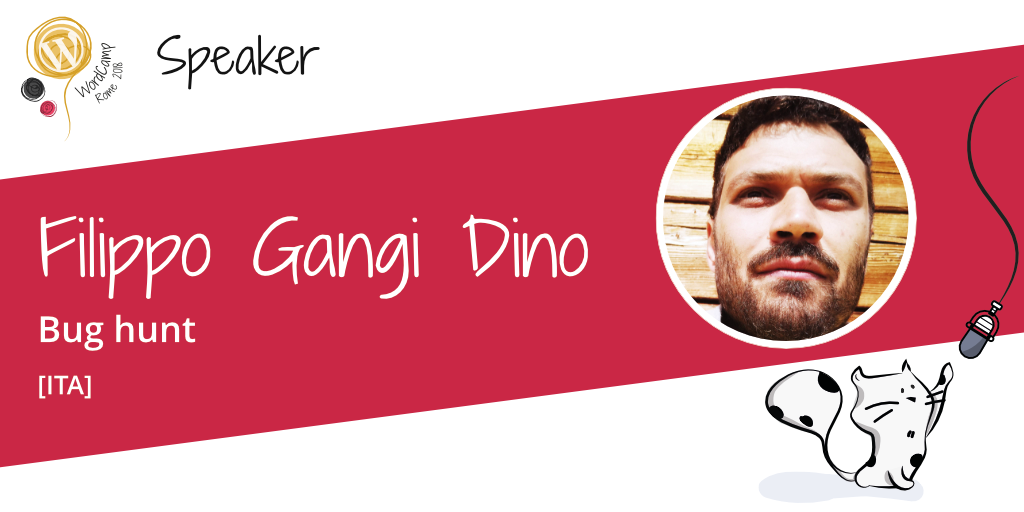
TALK: Bug hunt (ITA)
Vestendo i panni di entomologi/programmatori, esploreremo l’insidioso e viscido mondo dei “bug”. Scopriremo che possono essere classificati in una tassonomia e come questa ci possa aiutare a costruire delle strategie per catturarli e “schiacciarli”.
Non è magia ma un modo per guidare l’istinto del programmatore in un processo logico di debugging.
Piero Savastano
Consulente in materia di data science, con particolare attenzione alle applicazioni commerciali di data visualization e al machine learning. Divulgatore scientifico su Youtube.
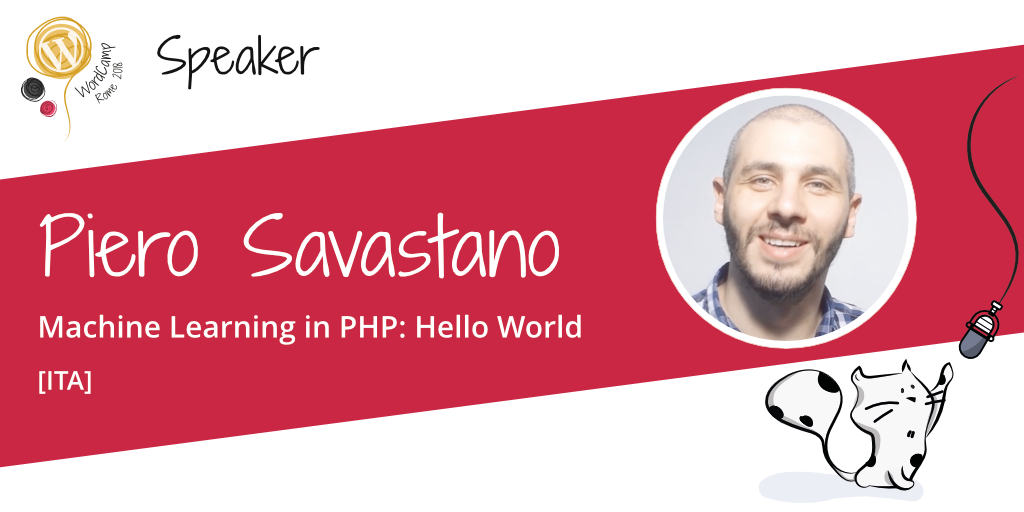
TALK: Machine learning in PHP: hello world! (ITA)
L’ecosistema del Machine Learning sta crescendo e una serie di funzionalità alle quali prima si poteva avere accesso soprattutto tramite linguaggi come Python o R sono ora disponibili anche in PHP, aprendo numerosi casi d’uso in ambiente WordPress. Vediamo un esempio minimale di Machine Learning in PHP con la libreria open source PHP-ML.
Marco Chiesi
Ingegnere informatico, con una passione di lunga data per il web e l’open-source. Amante di WordPress, ambito in cui è attivo su vari fronti: Sviluppatore di plugin (tra cui il popolare Black Studio TinyMCE Widget, 7+ milioni di download), Core contributor, Organizzatore del nascente WordPress Meetup di Teramo, PTE globale del team Polyglots, WordCamp speaker.
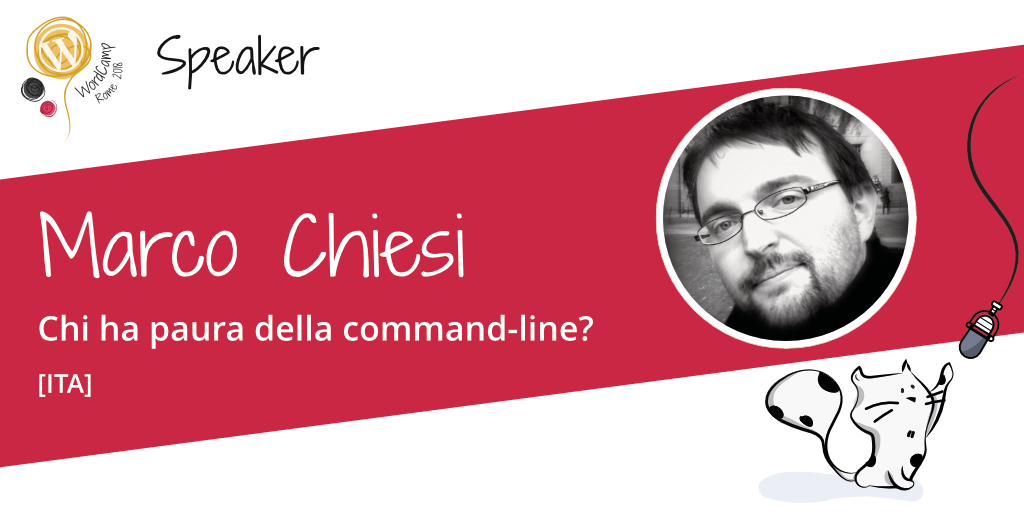
TALK: Chi ha paura della command-line? (ITA)
Negli ultimi decenni le interfacce uomo-macchina dei sistemi informatici si sono evolute incessantemente con l’obiettivo di rendere l’interazione con gli utenti sempre più semplice e intuitiva.
Ci sono però ambiti specifici in cui l’interfaccia a “riga di comando” si dimostra tutt’oggi uno strumento insostituibile. Ne è la dimostrazione il crescente successo del progetto WP-CLI, supportato ufficialmente da WordPress. Non è indispensabile essere programmatori o sistemisti per trarre un vantaggio diretto e tangibile dall’utilizzo di strumenti basati su riga di comando.
Questa talk, dopo una rapida introduzione sull’argomento, presenterà una carrellata di esempi pratici e di semplice applicazione, in cui l’uso della command-line può far risparmiare tantissimo tempo.
John Blackbourn
John Blackbourn è uno degli sviluppatori del core di WordPress, fa parte del team sicurezza di WordPress ed è stato il release lead di WordPress 4.1.
John lavora come sviluppatore senior per Human Made in Gran Bretagna, possiede più di 12 anni di esperienza di sviluppo con WordPress ed è un sostenitore dell’open source.
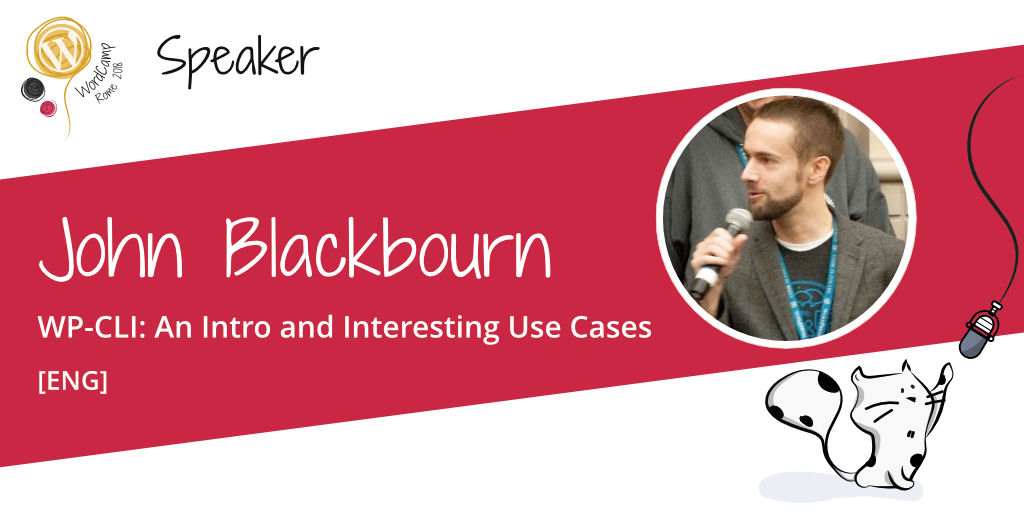
TALK: WP-CLI: An Intro and Interesting Use Cases (ENG)
WP-CLI è l’interfaccia di riga di comando per WordPress. In questo talk John introdurrà i concetti fondamentali di WP-CLI, spiegherà come utilizzarlo per gestire i vostri siti e presenterà alcuni interessanti casi d’uso.
Luca Ricci
Luca ha costruito il suo primo sito a soli 8 anni. Da allora sono passati 15 anni, tanti lavori diversi, il suo interesse è diventato una passione ed ha scoperto WordPress.
Il suo amore per questo software lo ha portato al WordCamp Brighton, dove ha fatto la conoscenza di Pragmatic. Un mese dopo stava facendo le valigie per trasferirsi a Brighton.
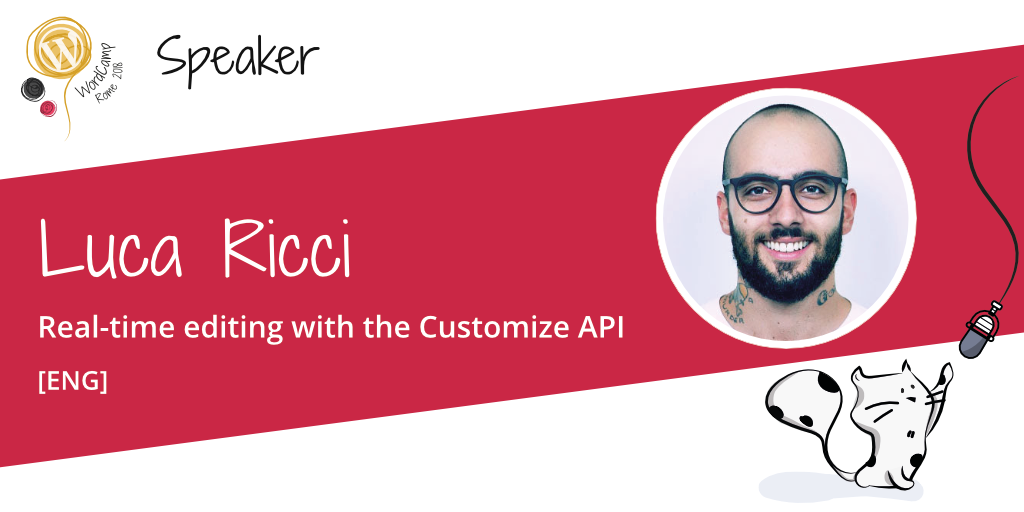
TALK: Real-time editing with the Customize API (ENG)
Il Customizer è stato introdotto con WordPress 3.4, nonostante questo è una feature molto sottovalutata.
In questo talk scopriremo cos’è, che strumenti abbiamo a disposizione e come estendere queste funzionalità con le Customize API.
Alla fine del talk, l’utente avrà tutte le informazioni necessarie per iniziare ad integrarlo nei suoi temi e/o plugins.
Antonio Giovanni Schiavone
Dottore in Informatica, dal 2013 ha svolto attività di ricerca presso vari Istituti del Consiglio Nazionale delle Ricerche occupandosi di Accessibilità ed Usabilità Web, Semantic Web e Data Visualization. Dal 2017 è Consulente presso L’Agenzia per l’Italia Digitale nell’ambito del progetto “Identità Digitali”.
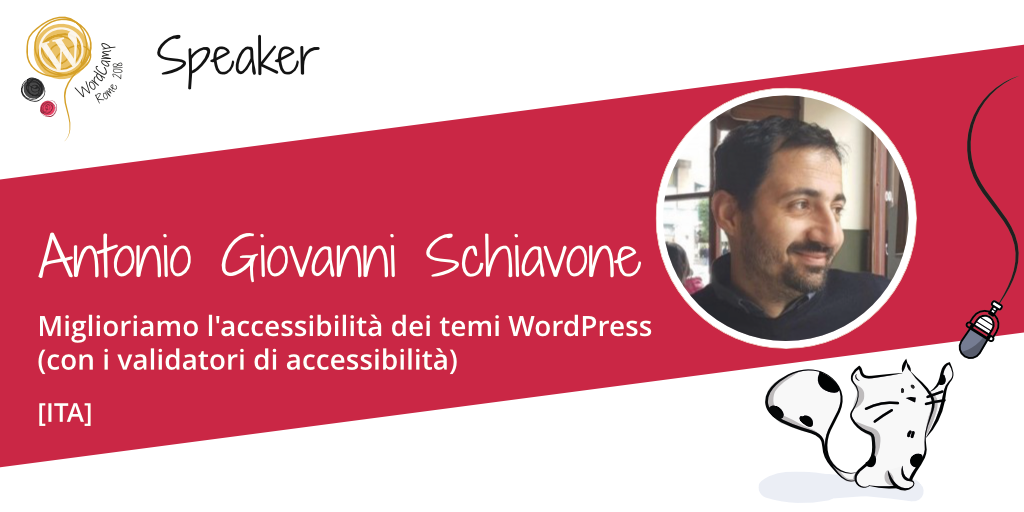
TALK: Miglioriamo l’accessibilità dei temi WordPress (con i validatori di accessibilità)(ITA)
Nella scelta del tema migliore per un progetto digitale basato su WordPress, molti webmaster sono spesso guidati da fattori estetici, limiti di spesa o funzionalità native del tema. A volte però il tema perfetto per il nostro progetto risulta non essere facilmente fruibile dagli utenti che hanno esigenze speciali, quali gli utenti disabili. Attraverso l’uso di alcuni strumenti di validazione automatica, illustreremo come migliorare l’accessibilità del tema dei nostri sogni, e rendere il nostro sito “realmente fruibile da tutti”.
Sarai dei nostri al WordCamp Roma 2018?
I’m going to introduce you the second batch of speakers who will enrich the second editio of the WordCamp Rome.
They have different skills and backgrounds, but they have in common a topic. They will talk about development, not just for WordPress, and you will find them amazing even if you work with another software.
So what you are waiting for? Buy your ticket now and don’t miss our wonderful speakers
Filippo Gangi Dino
A career as marketing graphic designer and years of consolidated experience first with WordPress and then with Ruby. Today he juggles between Javascript and Elixir. He works at WeLaika and organizes the TorinoCodingSociety.
TDD, ‘Clean code’ and open source lover.

TALK: Bug Hunt (ITA)
Playing the role of entomologists/programmers we will explore the insidious and slimy world of “bugs”. We will find out that they can be classified into a taxonomy and how this can help us build up strategies to capture and “crush” them.
It’s not magic, just a way to focus programmer’s instinct into a logical debugging process.
Piero Savastano
Data science advisor with a particular attention to commercial implementations of data visualization and machine learning. He has a Computer Science channel on Youtube.

TALK: Machine learning in PHP: hello world! (ITA)
Machine learning environment is growing and many features, that were previously only for languages like Python and R, are now available for PHP too. This opens several use cases in the WordPress environment. We will see an example of PHP machine learning with open source PHP-ML library.
Marco Chiesi
IT engineer with a long-standing passion for web and open-source. WordPress lover and active contributor: plugin Developer (including the well-known Black Studio TinyMCE Widget, 7+ million downloads), Core contributor, Organizer of the new-born WordPress Meetup of Teramo, Global PTE of the Polyglots team, WordCamp speaker.

TALK: Who’s scared of command-line? (ITA)
In last decades Human-Machine interfaces of computer systems have evolved incessantly with the aim of making interaction with users more and more simple and intuitive.
However, there are specific areas in which the “command-line” interface is still an irreplaceable tool. Proof of this is the growing success of the WP-CLI project, officially supported by WordPress. It is not essential to be programmers or systems engineers to gain a direct and tangible advantage from using command-line tools.
This talk, after a quick introduction on the subject, will present a series of practical examples, in which the use of the command-line can save a lot of time.
John Blackbourn
John Blackbourn is one of the WordPress core developers, a member of the WordPress security team, and was the release lead for WordPress 4.1. John works as a senior developer at Human Made in the UK, has over 12 years’ experience developing with WordPress, and is a proponent of open source software.

TALK: WP-CLI: An Intro and Interesting Use Cases (ENG)
WP-CLI is the command line interface for WordPress. In this talk, John will introduce the core concepts of WP-CLI, talk about how to use it to manage your websites, and cover a few interesting use cases for it.
If you’ve never heard of WP-CLI, or you’re an experienced user, hopefully there will be something of interest for you in this talk.
Luca Ricci
Luca built his first website for fun when he was just 8. 15 years and many different jobs later, his interest turned into a passion and he discovered WordPress. His love for WordPress led him to WordCamp Brighton where he met Pragmatic. One month later he was packed up and on a plane to move to Brighton, UK.

TALK: Real-time editing with the Customize API (ENG)
Customizer was introduced with WordPress 3.4, although this is a very undestimated feature. In this talk we will find out what it is, what tools we have available and how to extend these features with the Customize API. At the end of the talk, the user will have all information needed to start integrating it into his/her themes and/or plugins.
Antonio Giovanni Schiavone
MS in Computer Science, since 2013 he has taken part in research activities of various Institutes of the National Research Council, dealing with Web Accessibility and Usability, Semantic Web and Data Visualization. From 2017 he is Consultant at the Agency for Digital Italy in the context of the “Digital Identity” project.

TALK: Miglioriamo l’accessibilità dei temi WordPress (con i validatori di accessibilità)(ITA)
Choosing the best theme for a WordPress-based digital project, many webmasters often focus only on the aesthetic point of view, the budget or the native features of the theme itself. Sometimes, however, the perfect theme for our project is not easily usable by users who have special needs such as disabled users. Through the use of some automatic validation tools, we will illustrate how to improve the accessibility of the theme of our dreams, and make our site “really usable by everyone”.

